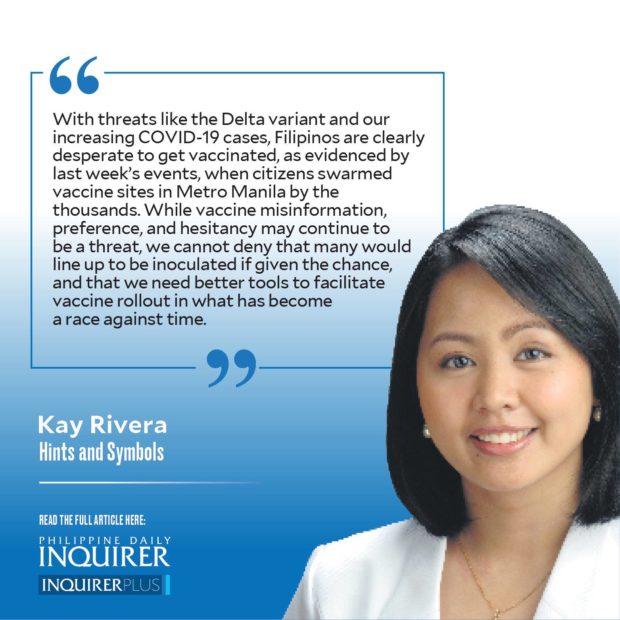
A few weeks ago, I read about the “click wars” of South Korean youth, who engage in “frantic clicking” to look for leftover or unclaimed vaccine doses. The system to reserve no-show vaccines is made possible through the portal Naver and the messaging app KakaoTalk. Users can check for availability of clinics’ leftover vaccines in real time through maps and secure slots even outside of their districts. They can also opt in advance to be notified of available vaccine slots. Slots can disappear within seconds. Because of this relatively easy access and a large number of citizens eager to get inoculated, the race for leftover vaccines has become a stressful “click war,” especially for young people under 55 who are not among the first priority for vaccination slots, but who may avail of these slots.
I empathize with those dealing with such vaccine rollout issues, but on behalf of my unvaccinated friends and family, I must admit to feeling a little envy. We are now being put under yet another lockdown, which is a massive source of frustration, but for certain populations, there is virtually no difference: young, relatively healthy, and unvaccinated persons, working from home and not heading out unless necessary, have been essentially imprisoned in their homes since last year.
As a medical professional I must agree with rollouts that prioritize the sick and elderly over those who are more able-bodied. However, these young and healthy individuals are often those who must venture outside their homes for errands, essential goods, and medications. They must bring their sick and elderly for vaccinations and consultations, while getting no vaccinations themselves. As unvaccinated persons, they must still limit excursions outside the home, and they risk infection any time they venture outdoors. Being young and able-bodied does not guarantee that they will have less severe or less lethal COVID-19 disease once infected: we have seen too many previously healthy youth succumb to the disease to believe that. I do not envy this group’s mental burden of waiting for vaccines while languishing under what is essentially a perpetual lockdown.
My partner, for instance, has been patiently waiting for a vaccine. He has reached out to his company, to no avail. The local government unit to which he belongs, hailed as a model city government by some, has yet to contact him about his slot, though he has long since registered. There are no walk-in vaccinations in his area. Given recent vaccination site horror stories, he would be hesitant to line up for a vaccine slot anyway: staying for hours in congested areas with hundreds of strangers sounds like a surefire way to risk infection with no guarantee of a vaccine jab. Efforts to ask for vaccination slots in other cities have been stymied by requirements of proof of residence. Short of faking a medical certificate for comorbidities (which he will not do) or using “connections” (which do not exist), he will need to wait quietly at home for his LGU to open up a slot. Another friend from the “young and healthy” group has not left her home in more than a year but for short excursions for errands. There is no online vaccine registry at their city. She has had to accompany an elderly family member for the latter’s vaccinations, and to date has not been given the opportunity to register for one of her own.
These two have profiles that mirror so many others: nonessential workers they may be but they are still breadwinners and the ones who must actively care for the needs of their sick and elderly. They do not have the privilege of engaging in a “click war” to secure a vaccine slot, as there is no such system in the Philippines that will easily and in real-time allow leftover slots to be claimed across cities. Some cities allow online registration, with registries that help to serve as “quick substitution” systems in place of no-shows. However, clearly, access is still difficult and prone to delays, with no real time updates and no central portal to access information.
Is it possible for us to maximize vaccine supplies and minimize crowds by devising a centralized, easily accessible system across cities that allows for booking no-show vaccines in real time? Is it also possible for us to make this service accessible for those without steady internet access? With threats like the Delta variant and our increasing COVID-19 cases, Filipinos are clearly desperate to get vaccinated, as evidenced by last week’s events, when citizens swarmed vaccine sites in Metro Manila by the thousands. While vaccine misinformation, preference, and hesitancy may continue to be a threat, we cannot deny that many would line up to be inoculated if given the chance, and that we need better tools to facilitate vaccine rollout in what has become a race against time.